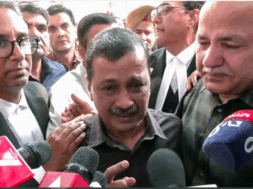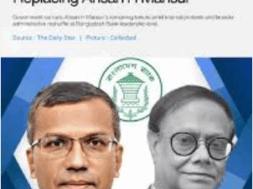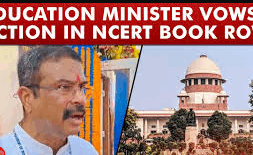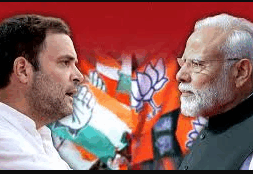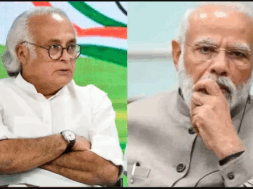
Manas Dasgupta
NEW DELHI, Apr 20: The Chief Justice of India DY Chandrachud on Saturday hailed the enactment of the new criminal justice laws as a “watershed moment” and said “the newly enacted criminal laws have transitioned India’s legal framework on criminal justice into the new age.”
Addressing a conference in New Delhi on “India’s Progressive Path in the Administration of Criminal Justice System,” organised by the Union Ministry of Law and Justice, Justice Chandrachud said India was set for a significant overhaul of its criminal justice system but the new laws would be successful only if those who are in charge of implementing them adapt to them.
He said the new laws have transitioned India’s legal framework on criminal justice into a new age. He also said much-needed improvements have been introduced to protect the interests of victims and carry out investigation and prosecution of offences efficiently.
“India is set for a significant overhaul of its criminal justice system with the upcoming implementation of three new criminal laws. The Bharatiya Nyaya Sanhita, Bharatiya Nagarik Suraksha Sanhita, and Bharatiya Sakshya Adhiniyam will replace the Indian Penal Code 1860, the Code of Criminal Procedure 1973 and the Indian Evidence Act 1872, respectively. These laws signify a watershed moment for our society because no law affects the day-to-day conduct of our society like the criminal law,” he said.
He said the “enactment of these laws by Parliament is a clear indication that India is changing and on the move, and needs new legal instruments to deal with the current challenges.” Criminal law directs the moral arc of a nation. The underlying justification for the substantive provisions is the age-old harm principle, which is best summarised in the saying, ‘Your right to swing your arms ends just where the other man’s nose begins. Procedural law, which governs crimes from the state of setting the criminal process in motion to the conviction for the commission of the offence, ensures that no person is charged and subsequently convicted for offences without due process of law, he added.
“Our laws and their implementation are an ever-evolving area. There is no finality to any law or the manner of its implementation. However, we must be willing to embrace positive changes to meet the needs of our times. I expect that with the implementation of the new criminal laws, we will discover loopholes and areas that need to be addressed. Such debates would be helpful in enhancing the efficiency of our criminal justice systems. However, the ideological framework at the heart of our analysis must be justice-oriented with a civil liberty-centric approach that balances the interests of the victim and the accused,” he added.
“Our laws need to address these concerns and obviate age-old issues like delays in examination of witnesses, conclusion of trials, overcrowding of prisons and the issue of undertrial prisoners,” he said.
The 248th Report of the Standing Committee of the Rajya Sabha on the Bharatiya Sakshya Sanhita of November 10, 2023, noted that the Indian criminal justice system has struggled to keep pace with the profound technological changes our socio-economic milieu that have radically re-imagined the way in which crimes manifest in society.
The growing scope of technology and new-age crime, which use the digital landscape to create networks of collaborative units to commit crimes, cannot be pinned to investigative situations. This has presented challenges in the investigation of crimes, admission of evidence, prosecution, and delivery of justice, he said.
“The BNSS encompasses a holistic approach to deal with crimes in the digital age. It prescribes audio visual recording of search and seizures and the presence of a forensic expert at the crime scene for offences punishable with more than seven years imprisonment.
“The audio-visual recording of search and seizures is an important tool for the prosecution as well as for protecting the civil liberties of citizens. The judicial scrutiny would safeguard the rights of citizens against procedural impropriety during search and seizures,” he said.
CJI Chandrachud said we must continuously introspect and protect the privacy of the accused as well as the victim when dealing with digitisation of proceedings and creating digital evidence. “In the digital age, the data and sensitive information of person’s has gained paramount importance. This data can allow us to gain unparalleled efficiency and ease. However, the power which comes with personal data puts a corresponding duty to make systems which are immune to penetration and leakage of the data,” he said.
On the challenges of data leak in courts, the CJI said the safety of a person, the stigma attached to an accused, the threat perception of a witness will be compromised if the privacy of the stakeholders is not protected. “We must inspire public confidence in securing the privacy of our citizens to gain an overall efficiency and trust in the criminal justice system. Technology holds the key to a futuristic court system,” he said.
While the new criminal laws create provisions which are synchronised to our times, the CJI said we must also ensure that the infrastructure accompanying these procedures are developed adequately for the country to reap the benefits of the new laws. “This naturally means that we must heavily invest in capacity building of our forensic experts, conduct training of investigating officers, and invest in our court system. Key provisions of the new criminal law would only produce a positive impact if these investments are made as soon as possible,” he said.
CJI Chandrachud said our attention must be focused on improving investigations by allowing for multi-disciplinary investigating teams with law enforcement officers, and domain experts in the field of cyber-crime, and pattern recognition. “I expect that with the implementation of the new criminal laws, we will discover loopholes and areas which need to be addressed. Such debates would be helpful in enhancing the efficiency of our criminal justice systems. However, the ideological framework at the heart of our analysis must be justice oriented with a civil liberty centric approach which balances the interests of the victim and the accused,” he said.
As the distinguished American jurist Justice Oliver Wendell Holmes said in “Law in Science–Science in Law”, that “everyone instinctively recognises that in these days, the justification of a law for us cannot be found in the fact that our fathers have always followed it. It must be found in some help that the law brings towards reaching a social end that the governing power of the community has made up its mind that it wants,” he added.
The three laws, ie, the Bharatiya Nyaya Sanhita, 2023; the Bharatiya Nagarik Suraksha Sanhita, 2023; and the Bharatiya Sakshya Adhiniyam, 2023, replace the earlier criminal laws, namely, the Indian Penal Code 1860, the Code of Criminal Procedure, 1973 and the Indian Evidence Act, 1872. As notified, these criminal laws are to take effect from July 1. However, the provision related to cases of hit-and-run by vehicle drivers would not be implemented immediately. The Three laws got Parliament’s approval on December 21 and the President’s assent on December 25.
Other dignitaries who attended the conference include Arjun Ram Meghwal, Minister of State (independent charge) for the Ministry of Law and Justice, R Venkataramani, Attorney General for India, Tushar Mehta, Solicitor General of India, Rajiv Mani, Law Secretary, Government of India, among others.
The conference aims to bring out the highlights of the three criminal laws and organise meaningful interactions through technical and question-and-answer sessions. Besides, judges of various courts, advocates, academicians, representatives of law enforcement agencies, police officials, public prosecutors, district administration officials and law students also participated in the conference.

